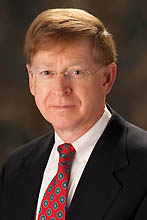
Terry M. ManonRetired Director, Trane Commercial Systems Air Handling Strategy In recognition of his global achievements as a leader in the HVAC industry Terry Manon has led teams around the world in creating win-win situations for his company, its employees, and its customers. A consummate problemsolver, he thrives on achieving continuous improvement — with a strong focus on people. “You need informed, involved, and empowered people to develop great products and improve business performance,” he says. When creating a single, global business from three independent regional organizations, Manon traveled to the relevant countries to listen to customers, suppliers, distributors, and the local Trane employees. He wanted to understand the similarities and differences in markets, customer needs, and business challenges before developing a global strategy. He also learned that cultures required different communication. “In some Asian cultures, employees will interpret suggestions from authority figures as directives,” he says. “Or they will simply agree with what is being proposed by an authority figure, rather than voice a different opinion based on their knowledge of the local market or business realities. I had to continually emphasize that I needed them to decide what was right for their local situation and that they had the ultimate responsibility, and authority, for deciding what was necessary to make their business succeed.” Empowering people and earning their trust was key during a particularly challenging situation involving Trane’s U.S. Air Handling business. The Lexington, Kentucky-based business was not profitable, was losing market share, and had a long history of work stoppages. “It had outdated products, outdated business and manufacturing processes, and some of the worst labor-management relations in Trane,” Manon says. The plant was slated for closing, but Manon’s team felt it could be saved. “We concluded that we would have to redesign all products, reduce management layers, replace outdated batch manufacturing and MRP systems with lean processes and techniques, and address our factory work rules and labor grades — simultaneously.” Fixing labor relations proved the most difficult hurdle. “The long-standing union president distrusted Trane management and needed to be convinced that completely changing the way we ran the business was not just an option if we were to survive; it was unavoidable,” says Manon. “We shared the performance trends and convinced him of the business realities. Once he understood and trusted us, he became a partner and worked to help us accomplish our labor objectives. We were the first UAW plant to allow temporary employees to work side by side with union employees.” Over a five-year period, the business grew employment by 40 percent and more than doubled its sales and market share, becoming one of the most profitable in Trane. It also became a benchmark for other union and union-free companies that were trying to implement lean techniques in a mixed-model manufacturing environment. Retired from Trane since 2009, Manon is now giving back in a variety of ways. “I want to help others by spending time with my family, volunteer organizations (Habitat for Humanity and church), and university and company advisory committees and boards,” he says. Career Highlights
|
DEAs : Our People - Mechanical Engineering - Purdue University
Skip to main content
Search
Loading
